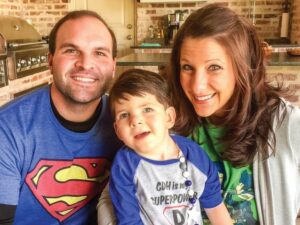Drew Moscona loves to swing and feel the wind on his face.
He is a happy toddler who will turn three in a few months, and you would never know that he was born with his stomach in his chest and only a tiny left lung.
Erika and Matt Moscona have journeyed a long way. They finish each other’s sentences as they describe how far their little family has come since the diagnosis of a heart problem and Congenital Diaphragmatic Hernia (CDH). CDH is the failure of the diaphragm to form which causes abdominal organs to migrate into the chest cavity. This inhibits lung growth and can endanger other organs.
Stunned with this news, Erika and Matt floundered. Matt regained his composure and discovered that one of the two hospitals that specialized in CDH was Texas Children’s in Houston. They made appointments and spent nearly a year there off and on, including seven months in the NICU. The Mosconas did all they could to assure the best care for Drew. Matt promised Drew then and now, “I will give you everything I can, if you can just meet me halfway.”
Matt describes Drew’s major surgery, “They move everything down, so it’s a question if the lung will inflate. Drew’s is inflating and growing, so that’s good news.”
With eight surgeries in the rearview, the Mosconas can shift their attention on improving Drew’s daily life. Drew’s grandmothers help while Erika works at St. Jude as the guidance counselor and Matt hosts AFR on ESPN 104.5. Erika shares, “Our main focus now is therapy. We are kind of out of the woods as far as surgery goes.”
Erika and Matt light up when they describe their miracle. He and his team are working hard to pass developmental milestones. “He does therapy five days a week, occupational, feeding, speech, and physical. We have an amazing team of ladies who work with him,” Erika states.
Though Drew is responding well, the biggest challenge is communication. His speech is limited to one word, “More.” Erika explains, “He knows what he wants more of, and in his mind it makes sense, but I don’t always know what he wants. His receptive language skills are pretty good, but his expressive needs work. That gives us hope though. While it’s slow progress, he has never plateaued.”
Although “the CDH repair is fixed and all of his organs are back in place, he still deals with the effects,” Matt shares. Drew eats differently than most kids because he has a gastronomy tube (G-tube) that allows him to eat via a pump and feeding bags. Drew is an active toddler, so the Mosconas plan an activity like a walk, drive, or nap during his hour-long feeds. “We try to simplify our life as much as we can so we can have our little normal,” Erika says.
CDH affects the Mosconas in other ways, too. They are cautious about where they go because of his minimized respiratory function. They also work together dispensing his eight meds and 18 syringes a day. “Early on, we were concerned with his mortality which was terrifying. Yes, he has a different reality than many kids,” Matt observes, “but I look at Drew and I see a happy boy who hasn’t had to be hospitalized for nearly a year now.”
For parents struggling with a difficult diagnosis, Erika and Matt both advise, “Ask questions and advocate for your child. There are options out there.” They also want other couples to know that it’s okay for one parent to respond emotionally and the other to take charge. Matt shares that in their marriage they have to be patient with one another because they respond to Drew’s progress in different ways.
The Mosconas delight in watching Drew careen around the living room in his walker or giggle with glee as Matt tosses and flips him on the bed. “We are amazed that we get to look at him every morning and night. There’s always moments of doubt and grief, but I replace them with belief. Whatever we have to do, we’ll do for him forever,” Matt exclaims. ■





